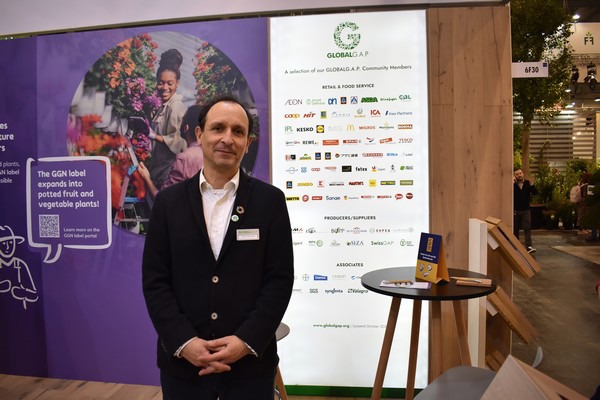Certifications have become increasingly important over the last years as more and more retailers are demanding it. GlobalGAP is one of them and not only the interest increased over the years, they fine-tuned their standards and added more tools and modules to support the growers and the industry become more sustainable. In this article, we will discuss the global standard IFA, the new module IDA for environmental metrics, the role of FSI, and GRASP on the social side and how these certifications help growers and the industry. This is explained by Juan Carlos Isaza, Technical Expert Floriculture at GlobalGAP.

Juan Carlos Isaza at the IPM Essen 2023.
IFA: GlobalGAP standard for flowers and ornamentals
The GlobalGAP brand began its journey as EureGAP in 1997 and the GlobalGAP standards for flowers and ornamentals have been operational for almost 20 years. IFA, short for Integrated Farm Assurance is a global standard for responsible floriculture practices. “IFA is about guiding the producer. Give them the script and they fill it in, it is more of an organizer. They have the knowledge. It covers all stages of production, from preharvest activities such as soil and water management to plant protection products and postharvest activities. The standard adopts a holistic approach, with principles and criteria that cover the key topics of environmental sustainability and biodiversity, workers’ health and safety, , production processes, and traceability.” Lately, a new version, v6, has been introduced which will be obligatory in 2024.
IFA and FSI
According to Isaza, the demand for their flagship IFA standard increased over the years, but took a leap when FSI was introduced in 2013. FSI, or Floriculture Sustainability Initiative, is a market-driven initiative that brings together members of the international floriculture sector to encourage progress in sustainability measures. This progress rests on the three pillars of responsible production and trade, responsible conduct, and integrated reporting. GlobalGAP’s IFA standard has been recognized in the FSI’s GAP (Good Agricultural Practices) category since its inception. In total, there are three categories; the other two categories are Social and Environmental. Currently, there are 16 voluntary sustainable standards and schemes in the FSI Basket of Standards, sorted according to these three categories.
IDA – enviromental metrics
Two years ago, in 2020, GlobalGAP lauched Impact-Driven Approach to Sustainability module (or IDA for short. It is a digital record-keeping system, which allows floriculture producers to collect, record, and interpret their environmental data. “We developed IDA for the environmental registration basket of FSI and as part of a stronger outcome-approach to sustainability, a vision of our directors”, Isaza explains. In contrast to IFA, which is about practices, IDA is about metrics and about getting an insight in how much your company uses, like how much water do you use, so real numbers. The IDA system can be used as a so-called add-on (meaning in combination with further GlobalGAP certification) or independently as a standalone module.
And Isaza expects that the interest for this module will grow significanlty in the coming years. “First of all, environmental metrics are increasingly more demanded nowadays. Secondly, with the current high prices of all input, it is valuable for growers to see and know how much they use and how it Ii compared to others. And finally, a lot IFA producers do not have IDA and it will take them only one extra hour on top of their IFA audit to receive IDA. So a few hours for IFA and an additional one or two for IDA. Then, the grower will be in both baskets, namely GAP and Environmental.”
Isaza is assured that this module will not only supportgrowers but the entire the industry to thrive. “We get more insight in the carbon footprint of the industry in general and therefore the sector can move its focus from the best to the ones that need to improve drastically and raise their performance level to those companies performing well. To visualize it, when looking at the industry and it’s energy use, for example, as a bell shaped curve – a normal distribution curve – on the side of less consumption we see the pioneers and on the side of higher consumptions those which may have an opportunity to improve (reduce). If as a sector, we focus on supporting these to move towards middle or “normal” consumption, it will have a positive impact on the overall sector performance.”
GRASP v2: Protecting the people behind our flowers and plants
On the social side, they have GRASP, GlobalGAP Risk assessment on Social Practice, which producers can voluntarily add to the IFA standard. Also here they recently introduced a new version, v2. “GRASP v2 contains much more efficient principles and criteria for forced labor risk indicators, the protection of human rights, and potential exposure to worker discrimination,” Flores explained. “The principles and criteria in GRASP were adapted to the reality of migrant labor flows, short-term contracting, and subcontracted labor risks. Producers now have access to better processes to provide social compliance to complicated labor resources. GRASP can now be applied to small family farms without hired labor. This opens up the opportunity for smallholders to participate in the international market.” With version 1, 200,000 growers globally were audited and version 2 will be obligatory in January 2024.
For more information:
GLOBALG.A.P
[email protected]
www.globalgap.org










